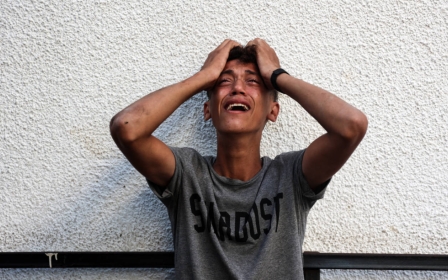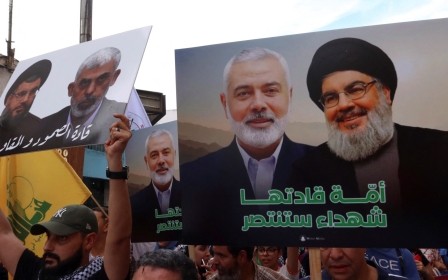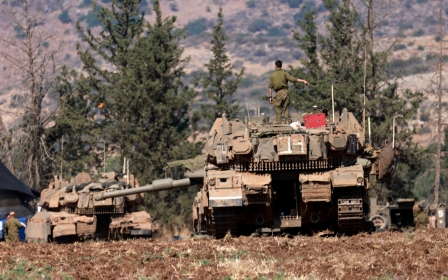Israel's Gaza war leaves Palestinians with trauma, questions about media 'complicity in genocide'

After a full year of Israel's war on Gaza, Laila el-Haddad thought she had seen it all. Being from Gaza herself, she witnessed Israel's occupation of the enclave firsthand as a journalist there in the early 2000s.
And throughout the past year, she has been attached to her phone, scrolling endlessly through her social media feeds to see the latest videos coming out of Gaza. She has seen babies beheaded by Israeli bombs, bodies decomposing on the ground, and parents holding their children's lifeless bodies. And limbs, countless limbs, everywhere.
But on Sunday, when an Israeli air strike hit a Palestinian hospital encampment for displaced people in Gaza's Deir al-Balah, causing a massive fire to erupt and kill several people, Haddad learned that there were horrors she had yet to witness.
"It's overwhelming because you're seeing everything just being flattened, being destroyed, being levelled, burning before your eyes," Haddad told Middle East Eye.
"Everything that you knew is just crumbling away and disappearing, and you feel like there's nothing you can do about it."
New MEE newsletter: Jerusalem Dispatch
Sign up to get the latest insights and analysis on Israel-Palestine, alongside Turkey Unpacked and other MEE newsletters
The scenes out of the makeshift tent hospital in Deir al-Balah were met with absolute horror from Americans on social media. It was one of several captured moments in the Israeli war on Gaza that instantly went viral, capturing millions of views in the span of a few hours.
For Palestinians living in the US, the footage of 19-year-old Sha'ban al-Dalou being burnt alive while lying down on his hospital bed and attached to an IV unlocked a new level of pain that many didn't know existed, after witnessing Israeli forces continuously bomb Gaza since October 2023.
'Everything that you knew is just crumbling away and disappearing, and you feel like there's nothing you can do about it'
- Laila el-Haddad
"The images from Deir al-Balah are seared into my memory and the memory of every person of conscience around the world who saw those images," Munir, a member of the Palestinian Youth Movement (PYM) who chose only to use his first name, told Middle East Eye.
"It's truly every time we think we've hit the rock bottom of the depravity of this Israeli genocide, it gets even worse."
The virality of Sunday's hospital massacre caused many major news outlets to cover the incident. But since Israel began escalating the war on Gaza into a regional conflict last month, much of the American media attention has shifted towards a potential Israeli war with Iran.
With the presidential election just weeks away, the war on Gaza has stopped receiving the same attention, even though Israeli forces continue their assault on the Strip on a near-daily basis.
Over the past 24 hours alone, more than 50 Palestinians in Gaza have been killed by Israeli forces.
"It's just absolutely agonising to have to keep watching this horror unfolding in front of us as the US media absolutely refuses to pay attention," Munir said.
"It's made it clear to me that the mainstream media is entirely complicit in this genocide.
The fact that most Americans are not even seeing these images is unconscionable, especially given the fact that we are literally funding this genocide."
'Gaza is our moral compass'
Half of Haddad's family is still in northern Gaza, which is currently under an Israeli military siege and where Israeli soldiers are saying they are implementing the "General's Plan".
She has lost touch with many of her relatives currently still living there and spends much of her time thinking about their fate.
Whenever she does manage to speak to a family member, she tries having ordinary conversations rather than focusing on the constant fear of being killed by Israeli forces.
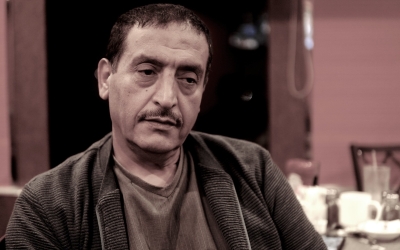
"Sometimes, honestly, we try to laugh or just have regular conversations. One of my cousins is staying in a small farm of ours. So I ask about the olive trees and what they're growing, and how they're watering them," Haddad said.
"And, you know, he's telling me how he's using whatever he can grow to help and pass it out to people."
But the grief is difficult to hold back when Palestinians in the diaspora have to witness atrocities carried out by Israel against Palestinians on a near daily basis.
The Gaza that Haddad knew is gone, and she knows that it will likely never return.
"Most things that you know and remember are now gone. My grandfather's home is gone. My aunt is gone. All of our neighbourhood in Gaza City and Rimal is gone, all the places that we would visit and pray in," she said.
For several weeks, Haddad's 80-year-old father stopped speaking out of an overwhelming sense of sorrow and despair.
To get him to feel better, Haddad ended up calling a relative in northern Gaza.
"I finally put him on a call with his eldest nephew in Gaza who is kind of a caretaker for everyone there, and he was trying to raise his spirits," Haddad said.
"Imagine, he in Gaza was trying to raise my dad's spirits, telling him, 'you are our elder and you're the most respected, and it's going to be okay, and we all love you'."
The moment took her back to a recent conversation she had with a young woman in Gaza, who told Haddad that Palestinians in Gaza didn't need the world. Rather, the world needs the Palestinian people in Gaza.
"People misunderstand. The world needs us because we've become the world's moral compass," Haddad recalled the young woman as saying.
'Refusing the politics of despair'
Despite the ever-worsening situation in Gaza, many Palestinian Americans are holding onto hope. The hope is not directed towards a belief that the US will make a policy change, such as demanding Israel end its war or cutting off military aid to the country, but that the Palestinian people living in Gaza and the West Bank will continue to resist Israel's war, its occupation, and its subjugation of their lives.
Meanwhile, in the US, Palestinian Americans will continue to organise and mobilise in the diaspora to bring attention to their collective plight.
"These scenes exact a brutal emotional and psychological toll on us as individual Palestinians, Lebanese, Yemenis, Syrians, Iraqis, Arabs, Iranians, etc, and on us as a collective community," Hatem Abudayyeh, chair of the US Palestinian Community Network (USPCN), told MEE.
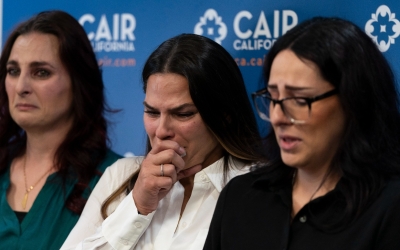
"My own coping mechanism is to continue doing what I know, trying to fight and struggle and organise every day to build a larger and stronger movement of community and allies to challenge the US government to end its complicity and use its power to stop terrorist Israel's genocide against our people."
Abudayyeh says he doesn't believe the attention towards Gaza is decreasing and says that believers in the Palestinian cause will keep the issue at the forefront of public discourse.
"And we will make certain that every single conversation about the November elections in the US includes the candidates' positions on Palestine and the genocide. We won't allow our battle to be ignored, and we will never stop on the path to a free Palestine, from the river to the sea," he said.
A year into the war, the PYM is continuing to organise rallies and demonstrations in major cities across the United States.
"The despair, the depression, the incredible sense of alienation can be overwhelming," said Munir from PYM.
"We refuse to give into the politics of despair and into the feeling of powerlessness that they are trying to create with us, and which is why we come together regularly to organise, to mobilise, to activate our communities."
Middle East Eye delivers independent and unrivalled coverage and analysis of the Middle East, North Africa and beyond. To learn more about republishing this content and the associated fees, please fill out this form. More about MEE can be found here.


